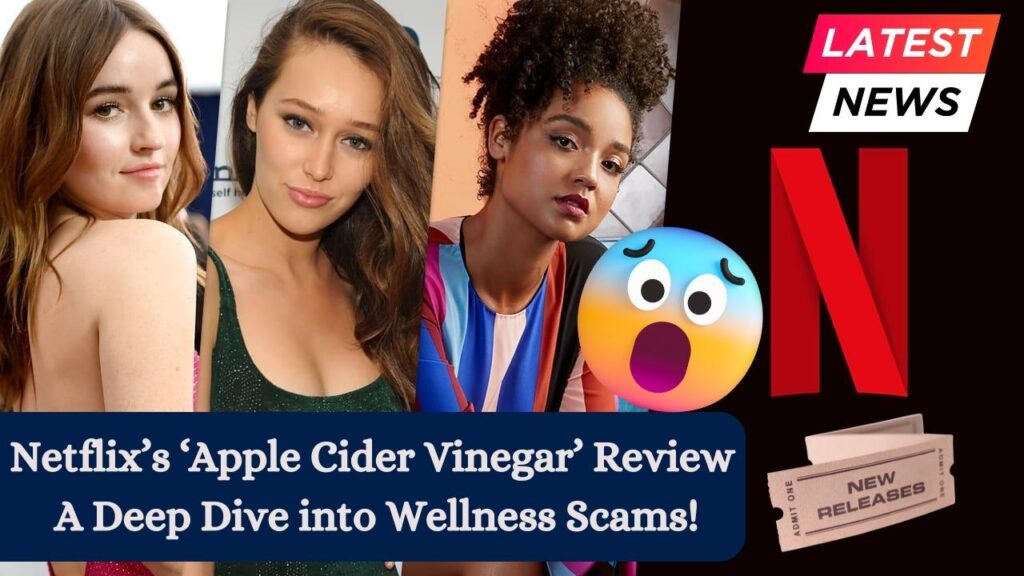Netflix’s ‘Apple Cider Vinegar’ Review – Netflix’s latest limited series, “Apple Cider Vinegar,” has taken the streaming world by storm, delving deep into the world of wellness scams and the dangers of misinformation in the health industry. The series follows the true story of Belle Gibson, an Australian influencer who falsely claimed to have cured terminal brain cancer through natural remedies, leading to a massive fraud that deceived thousands worldwide.

Netflix’s ‘Apple Cider Vinegar’ Review
| Feature | Details |
|---|---|
| Series Name | Apple Cider Vinegar |
| Platform | Netflix |
| Main Subject | Wellness scams, misinformation, influencer culture |
| True Story? | Yes, based on Belle Gibson’s case |
| Lead Actress | Kaitlyn Dever |
| Official Link | Netflix |
Netflix’s “Apple Cider Vinegar” is a must-watch for those interested in the dangers of misinformation in the wellness industry. It serves as a cautionary tale, reminding viewers to be skeptical of unverified health claims and always seek evidence-based medical advice.
Understanding the Wellness Scam Epidemic
The wellness industry is worth over $4.4 trillion globally, with millions of people seeking alternative health remedies. However, this rapid rise has also paved the way for unregulated and misleading health claims.
How Do Wellness Scams Work?
- Exaggerated Health Claims – Many influencers and brands promote miracle cures without scientific backing.
- Fear-Based Marketing – Scammers exploit health concerns to drive people towards their products.
- Social Proof & Testimonials – Fake success stories and paid reviews create an illusion of effectiveness.
- Lack of Scientific Evidence – Most claims lack clinical trials or scientific validation.
Case Study: Belle Gibson’s Wellness Empire
Belle Gibson built a wellness empire through her “Whole Pantry” app and cookbook, amassing millions of followers. Her story of curing brain cancer through diet and holistic healing resonated with many. However, investigations revealed she never had cancer. She was later fined $410,000 for misleading consumers but never paid the penalty.
Breaking Down Netflix’s ‘Apple Cider Vinegar’
The Plot & Key Themes
The series effectively portrays:
- The rise and fall of Belle Gibson
- The psychology behind influencer scams
- The role of social media in misinformation
- The impact on real victims who followed her advice
Kaitlyn Dever’s Performance
Critics have praised Kaitlyn Dever for her nuanced portrayal of Gibson. She captures the charm, manipulation, and eventual downfall of the influencer with precision.
The Role of Social Media in Spreading Misinformation
Social media has played a significant role in the rapid spread of health misinformation. Platforms like Instagram, TikTok, and YouTube amplify dubious health claims through viral content.
How Social Media Contributes to Misinformation
- Algorithmic Promotion – Content that generates high engagement spreads faster, regardless of accuracy.
- Influencer Culture – People trust influencers over experts due to emotional appeal.
- Echo Chambers – Users are often exposed only to content that reinforces their existing beliefs.
- Lack of Regulation – Many social media platforms lack strict policies on misleading health claims.
What Can Be Done?
- Tech companies must improve content moderation.
- Users should verify claims using trusted sources.
- Governments should impose stricter regulations on false health advertising.
Real-Life Consequences of Wellness Scams
Health scams don’t just result in financial loss; they can also lead to serious health consequences. People who rely on false treatments often delay or avoid scientifically proven medical care, worsening their conditions.
Notable Wellness Scams in Recent History
| Scam | False Claim | Impact |
|---|---|---|
| Essential Oils Cure Cancer | Claimed to eliminate cancer cells | No scientific backing; caused people to avoid chemotherapy. |
| Alkaline Diet Heals Diseases | Claimed to prevent all diseases | No evidence; misled people into dangerous diets. |
| Anti-Vaccine Misinformation | Claimed vaccines cause harm | Led to outbreaks of preventable diseases. |
How to Spot Wellness Scams
- Check Scientific Sources – Always look for research from trusted medical sources like the CDC, NIH, or WHO.
- Be Wary of “Too Good to Be True” Claims – Quick fixes and miracle cures are often red flags.
- Look for FDA Approval – Any health product making strong claims should be FDA-approved.
- Verify the Influencer’s Credentials – Many wellness gurus have no medical background.
Wisconsin Social Security Updates in 2025 – What’s Changing and How It Affects You!
What Makes DeepSeek the Next Big Thing in AI?
February Social Security Payments – First Round Being Sent Out on 12th February
Whose Portrait Is on the $50 Bill? Check Details About New U.S. Currency Bill
FAQs about Netflix’s ‘Apple Cider Vinegar’ Review – A Deep Dive into Wellness Scams?
1. Is “Apple Cider Vinegar” based on a true story?
Yes, it is based on the real-life case of Belle Gibson, who falsely claimed to have cured her cancer through alternative medicine.
2. Why do people fall for wellness scams?
People are drawn to quick solutions, fear of traditional medicine, and persuasive marketing tactics used by influencers.
3. How can I protect myself from fake wellness claims?
Do your research, verify sources, and consult medical professionals before following health advice online.
4. What should I do if I suspect a wellness scam?
Report misleading claims to authorities such as the FDA or FTC, and educate others about potential dangers.







